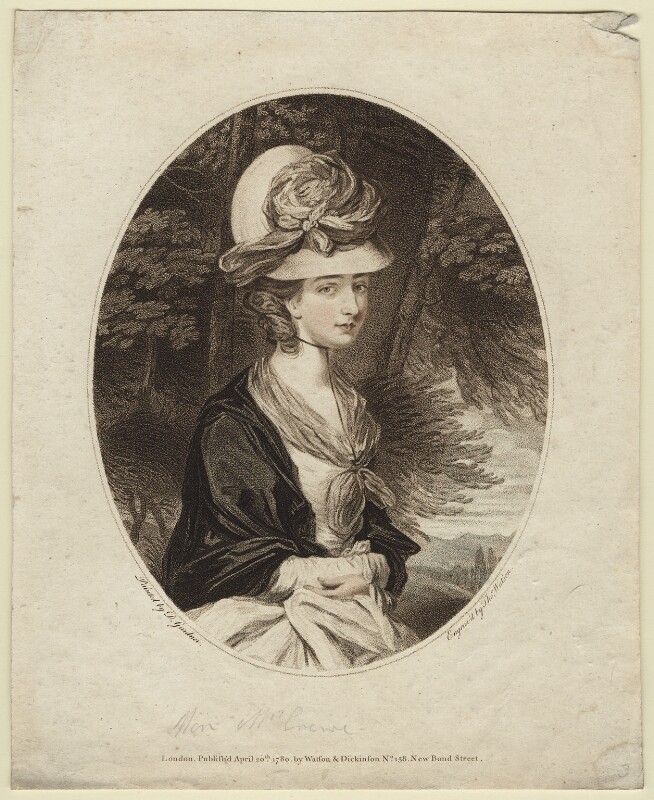[W]e met droves of Cattle & when we desired the Postilian to ask wither they were going, the Answer was to England this was one of many small occurrances which reminded me to day of being in a foreign Country & indeed in many respects it is very different, the Maners, the Language, the music are all new … (f. 135r)
Frances Crewe’s (1748-1818) account of the tour of north Wales she made in the summer of 1795, accompanied by her daughter Emma, suggests that she was both a curious and a well-prepared traveller. Crewe, a socialite and Whig hostess (fig. 1) who divided her time between London and Crewe Hall in Cheshire, refers to Thomas Pennant on numerous occasions as an authority on the places she visits. But she also records a variety of unexpected encounters ‘in a foreign Country’ that lead to a sense of shifting perspectives. Her tour presents an engaging narrative voice, with a seemingly open and candid approach to places and people, and a novelistic flair for relating situations and events.

Crewe had travelled widely before visiting Wales in 1795 (this was also not her first visit to Wales). She had previously written extensively about travel: the diary she kept in Paris in the mid-1780s (published in 2011) covers people, politics, current events, and all aspects of fashionable life. Her reaction to Cader Idris early on in the tour – ‘Seariously this Mountain beats every thing I ever saw since I was a Child, in Italy!’ (f. 133v) – is characteristic of her lively style; it also shows that her responses to Wales exist within comparative and continental contexts. Her comments on Welsh ‘Maners’, language and music read like real-time observations on the road but (sometimes complex) references within the text to Pennant, and to Edward Jones’s Musical and Poetical Relicks of the Welsh Bards (1784; see for example f. 141v), place Crewe’s tour in relation to a wider network of existing knowledge about Wales in the late eighteenth century. They also show her developing or adding to this knowledge, albeit in the relatively private space of the manuscript journal. (Some, though not all, of these references can be found in the margins of the tour, or on blank facing pages, sometimes in a different hand – something that may suggest later commentaries or reflections on Crewe’s Welsh experiences in 1795.)
Crewe’s especially positive depiction of Pennant offers new evidence for the ongoing reception of his tour and his contemporary reputation in the 1790s. Her comments on the medieval church at Corwen simultaneously praise Pennant as an architect of Welsh history and topography and reflect with some humour on the experience of those who follow in his footsteps as amateurs by comparison:
We have had a bright Sunshine all this day & before we left Corwen we walked to look at the Church & Church yard, they are boath [sic] much the handsomest we have seen yet, & they Contain antiquities of very great importance, to so accurate & minute an observer as Mr Pennant but to mere Clod Pole travelers, who come after him like ourselves who have no minds Eye like his, nothing but General Enthusiasm, without patriotism to [illegible] inspire! to us, very much is lost! (f. 143r)
Crewe’s textual encounters with Pennant and Jones almost certainly happened by design. This tour is, however, notable for another and this time unplanned encounter, with the Lichfield poet Anna Seward, famous since the early 1780s for a series of odes on national affairs.1 Seward was also touring Wales in the summer of 1795; her tour would later yield one of her best-known poems, ‘Llangollen Vale’, published in 1796. Crewe’s entertaining description of meeting Seward by chance at a Barmouth inn (f. 139v) gives us a brief ‘behind the scenes’ insight into Seward’s more formal account of Wales in her poetry and correspondence, in what feels like a particularly unscripted moment.2
Note on the source text:
The manuscript source is written in Frances Crewe’s mostly clear hand. Her account of Wales, which is part of a larger notebook, begins at f. 131, therefore the pagination in this edition starts from this point. The opening pages of Crewe’s tour have been digitised by the British Library: https://www.bl.uk/collection-items/the-welch-journal
Notes
1 Harriet Guest, Small Change: Women, Learning, Patriotism, 1750-1810 (Chicago: University of Chicago Press, 2000), pp. 252-70.
2 For Seward’s accounts of Wales in poetry and letters, see Llangollen Vale, with other Poems (London: G. Sael, 1796), and Letters of Anna Seward: Written Between the Years 1784 and 1807, 6 vols (Edinburgh: Archibald Constable, 1811), vol. IV.
Further reading:
- Michael Allen (ed.), An English Lady in Paris: the diary of Frances Anne Crewe 1786 (Oxford-Stockley Publications, 2011)
- Eric Salmon, ‘Crewe [née Greville], Frances Anne, Lady Crewe (bap. 1748, d. 1818)’, Oxford Dictionary of National Biography, Oxford University Press